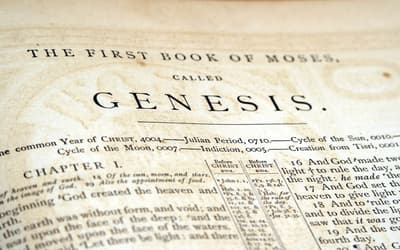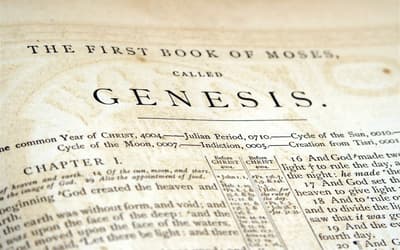The views expressed in this paper are those of the writer(s) and are not necessarily those of the ARJ Editor or Answers in Genesis.
Abstract
The dominion mandate was established by God both as the appointment of mankind to a position of authority in the earth and as a direct imperative actively to exercise that dominion. This status and project were both marred and rendered difficult by the dominion of sin and death after Adam’s fall, but they were not eradicated. The mandate is restored and renewed in the dominion of Christ, believers in Christ share in that dominion, and that dominion shall be accomplished while Christ reigns from His throne in heaven.
Keywords: dominion, dominion mandate, subdue the earth, law of God, Satan, Adam, mankind
Introduction
The January 2013 ARJ paper Is There a Dominion Mandate? generated some responses, published here with a reply by the author, linked below:
Is There a Dominion Mandate? Discussion papers:
- A Response to Darek Isaacs (Thomas D. Hennigan)
- In Defence of Human Dominion (Andrew S. Kulikovsky)
- The Dominion Mandate: Yesterday, Today, and Forever (Joel McDurmon)
Is There a Dominion Mandate? Response
Genesis 1:26–28 states that God created mankind in His image and likeness and gave man “dominion” over His creation. He then called man to be fruitful and to multiply, and to fill and to subdue the earth. While a prima facie reading of this text indicates it should produce relatively little controversy, such is not the case, especially in light of a recent article by Darek Isaacs, “Is There a Dominion Mandate” (Isaacs 2013), which argues that mankind’s dominion was never a command to begin with, and has never been applicable to mankind since Adam’s fall, nor will it. Does Scripture truly support these views? Or did God actually command Adam to exercise dominion? And if so, what relationship do the work of Christ and the union of believers with Christ have to that command, if any?
It is the purpose of this paper to review the concept of man’s dominion from its introduction in Genesis, through the fall of mankind, and into the post-Messianic era. While space will not permit addressing every single thought Mr. Isaacs presents, this essay will attempt to lay the proper theological foundation, and then address the most central concerns Isaacs raises.
The Dominion Mandate Before the Fall
While the phrase “dominion mandate” does not appear in Scripture verbatim, the account of mankind’s creation exhibits both terms—“dominion” and “mandate”—clearly. Genesis 1:26–28 relates,
Then God said, “Let Us make man in Our image, according to Our likeness; let them have dominion over the fish of the sea, over the birds of the air, and over the cattle, over all the earth and over every creeping thing that creeps on the earth. So God created man in His own image; in the image of God He created him; male and female He created them. Then God blessed them, and God said to them, “Be fruitful and multiply; fill the earth and subdue it; have dominion over the fish of the sea, over the birds of the air, and over every living thing that moves on the earth.” (Genesis 1:26–28)
Let us look at this passage in regard to each of the terms “dominion” and “mandate.” The first should not present any controversy, since most translations include the very term itself in verse 26 and verse 28. “Dominion” comes from the Hebrew word radâ, which means generally, “have dominion, rule, dominate” (Brown, Driver, and Briggs 1907, p. 921), or likewise simply “rule, govern” (Holladay 2000, p. 333).1 While there are many nuances of meaning that provide for a wide range of applications (both positive and negative) of this general term, the root meaning stands as a very simple idea: dominion or rule.
In Genesis 1:26, 28, most translations simply employ the word “dominion” (English Standard Version, King James Version, and New Revised Standard Version, to name a few). There are some exceptions, such as the New American Standard Bible, Young’s Literal Translation, and the JPS Tanakh (1985), each of which translates radâ as “rule” in this passage. It is, however, hardly controversial to understand “rule” as a synonym of “dominion.”
The fact of this dominion (radâ) is expressed twice, once each in verse 26 and 28. In both instances, the scope of mankind’s radâ is specified as over the animal kingdoms:
… let them have dominion over the fish of the sea, over the birds of the air and over the cattle, over all the earth and over every creeping thing that creeps on the earth. … have dominion over the fish of the sea, over the birds of the air, and over every living thing that moves on the earth.
Thus, in these particular foci, mankind’s original dominion was a rule over the animals.
Did the extent of the biblical description of
mankind’s original dominion stop at this point, we
may be tempted to think his dominion did not extend
to any of the rest of creation. Natural resources are
not mentioned here specifically, nor is the larger
natural world. But to deduce much from this limited
data set would not only be an argument from silence,
it would also ignore the further description Genesis 1:28
gives of God’s design for mankind: “… Be fruitful
and multiply; fill the earth and subdue it. …
” This
“subdue” is a reassertion and further application of the
dominion which God gave mankind. While “subdue”
here does not render another instance of rādâ, the
Hebrew kābăš carries a very similar general idea
with a largely overlapping semantic range. Hamilton
notes, “Of the two verbs rāḏâ, ‘exercise dominion,’
and kābaš, ‘subdue,’ the latter connotes more force”
(Hamilton 1990, p. 139). Kaḇaš means generally to
subject, make subservient, or subjugate (Holladay
2000, p. 151; cf. Brown, Driver, and Briggs 1907,
p. 461), and thus carries with it the idea of one’s
dominion over a subject. Kaḇaš is, one could say,
dominion in action, and thus differs from “dominion”
only in capturing the actual application of some form
of persuasion, manipulation, coercion, or force. In
verse 28, this application of dominion is directed to
hā’āreṣ, “the land” or “the earth.” Without entering
a larger discussion of whether this here intends to
mean “the earth” as in planet earth, “the land” as in a
designated plot of land, or “the land” in general, what
we can understand here is that this is an extension
of mankind’s dominion beyond the animal kingdoms
into the larger realm of nature.
Mankind’s dominion in regard to “the land” is reasserted in a parallel with the work Adam is concerned to do in Genesis 2:5, 15. It seems uncontroversial that “the land” includes the natural resources that land/earth bears. To “subdue” that land/earth would then indicate all works of tilling and keeping in regard to that whole scope of “the earth” or “the land” and all it bears. This would surely include agriculture, but also construction of roads and canals, irrigation, as well as mining and much else. While any of these activities could be engaged in exploitatively, they could also nevertheless be seen as expressions of proper dominion when performed for godly reasons and by godly means.
We should not fear to consider the scope of these works in the broadest sense possible. As Torah exegete S. R. Hirsch (1989) notes, kaḇaš hā’āreṣ in Genesis 1:28 refers to the general acquisition and dominion of “property” by which mankind engages in “the mastering, appropriating and transforming the earth and its products for human purposes” (Hirsch 1989, p. 35). This larger effort is to be considered fundamental to human dominion, or as Hirsch puts it, “a preliminary necessity for the preceding tasks of home and society which require it as the means for accomplishing them” (Hirsch 1989, p. 35). Those “preceding tasks” which verse 28 mentions, Hirsch notes, naturally cover the whole spectrum of human existence: “be fruitful” refers to marriage, “multiply” indicates family, “fill the earth” entails society, and “subdue” covers the whole scope of human endeavors and business that make the previous three possible. He concludes even more broadly: “By these sentences the seal of God is stamped on the whole of family and civic life” (Hirsch 1989, p. 35).
With the purview of Adam’s social tasks and custodianship of “the land” set parallel to his dominion over the animal kingdoms in Genesis 1:28, we are led to see these aspects as merely different perspectives of one larger whole. That is, mankind’s dominion was over the whole of creation.
Notice, however, that other humans are not included within the scope of mankind’s dominion. The original dominion mandate did not envision the need for man to subjugate other men.
With “dominion” being thus briefly acknowledged, defined, and outlined, let us consider the more controversial half of the phrase “dominion mandate.” Since the words “mandate” or “command”2 do not appear expressly in Genesis 1:26–28, some commentators have argued that there is no “dominion mandate.” Instead, these theologians maintain that Genesis is only stating a description of Adam’s position, not a commanded task.
For example, theologian Dave Hunt once argued that he “doesn’t see a task being given” in Genesis 1:26–28 (Hunt 1988). This view was expressed and argued at length recently by Isaacs who concluded,
The idea that dominion was a command [mandate] to Adam is alien to the biblical text. What is relayed in the Jewish Scriptures, which all respected translations remain true to, is that God, before the Fall, let Adam have a position of authority in creation. (Isaacs 2013, p. 3)
Several observations to the relevant texts quickly render such a position wholly incredible. First, while the terms “mandate” or “command” do not expressly appear in Genesis 1:26–28, the force of a command is nevertheless present in that God spoke to Adam and Eve in the imperative:
And God said to them, “Be fruitful [imperative form] and multiply [imperative form] and fill [imperative form] the earth and subdue [imperative form] it, and have dominion [imperative form] over the fish of the sea and over the birds of the air, and over every living thing that moves on the earth.” (Genesis 1:28)
The imperative form is by definition the issuing of a command. What else are we to deduce from these Spirit-inspired imperatives in the scriptural record except that they are de facto commands given lāhem (“to them”)? This should in itself end any discussion of Adam’s dominion not involving a mandate.
The presence of imperatives in verse 28 has even more significance in light of the repetition of mankind’s rādâ over the animals in that verse. The first record in verse 26 is God’s self-discussion and fiat in the creation of Adam: “Then God said, ‘Let Us make man in Our image, according to Our likeness; let them have dominion. …’” The verbal forms in these cases indicate simple action rather than imperative commands.3 This is particularly relevant in regard to rādâ in this instance. This text by itself could possibly be taken to indicate merely a description of Adam’s position in relation to the animal kingdom. The repetition of mankind’s rādâ in verse 28, however, disqualifies such a notion by placing the word rādâ in the imperative form. In other words, in verse 28, where we have already seen the scope of mankind’s dominion expanded to the whole of creation, the text further clarifies the nature of that dominion. God has not left us to wrangle about the possible meanings of verse 26. He has given us additional revelation in verse 28 from which we can see that mankind’s rādâ is not just a description of a position; it is a direct imperative as well. As such, the passage taken as a whole is describing the full range of Adam’s authoritative position as well as the task which such a position entails and to which Adam was commanded.
The discussion of verbal forms in Genesis 1:26–28 presupposes another fact that renders the “position only” interpretation invalid—a fact which should be obvious from the outset of any exegesis of this passage. This is the fact that rādâ and kaḇaš are present as verbs, that is, descriptions of action as opposed to static offices or other aspects which we would deduce were a mere noun or adjective present. Therefore, the grammar alone presents a prima facie case for Adam not only having a position of dominion but exercising dominion—that is, actively engaging in whatever tasks dominion and subduing of the land entails.
So while the consideration of the instance of ‘āśāh (“Let us make …”) and rādâ in verse 26 alone could possibly be construed as recording a mere appointment to a position of authority, to conclude from this that dominion was only a position and “not an order that was given” (Isaacs 2013, p. 2) is to neglect 1) the other keyword in the context, kaḇaš, 2) the verbal nature of those words, thus indicating action and not just status, 3) the imperative form of rādâ and kaḇaš in verse 28, thus indicating direct commands, and 4) the biblical expectation that appointment to an office entails faithful execution of that office. Such neglect of most of the relevant scriptural evidence from one’s consideration of the “dominion mandate” results simply in an insufficient analysis and produces a faulty conclusion. Considering these points, on the other hand, results in the unavoidable conclusion that mankind was given both a position of dominion and a series of direct commands to exercise that dominion in particular ways.
Ṣāwâ and wayyō’mer ʾĔlōhîm
Isaacs asserts that since the Hebrew word for “command” is absent from Genesis 1:26–28, we should not consider that passage as containing a mandate to Adam (Isaacs 2013, p. 3). The dominion mandate passage is contrasted with God’s “command” to Adam not to eat the fruit of the tree of the knowledge of good and evil (Genesis 2:16–17). In the latter passage, the word ṣāwâ (“command”) is used expressly. Since this word does not appear in God’s appointment of Adam to dominion, it is argued, we cannot understand this to be a command to exercise dominion.
But this argument carries certain assumptions that render it fallacious. First, it assumes that a technical word must necessarily appear in a particular passage before we can consider that passage a “command.” We have already disproved this notion above. Aside from the fact that the assertion is an argument from silence, the presence of imperative-form verbs supplies all that is needed to understand a particular word from God to be a command as opposed to a mere declaration of fact. In fact, in light of what follows, the imperative could be considered as providing greater certainty in this regard than the mere presence of the word ṣāwâ.
Secondly, the argument assumes that the word
in question is in fact a technical term that supplies
a particular technical force. This hermeneutical
assumption is dispelled by multiple examples in
Scripture. Good examples appear in the narrative of
Noah in Genesis 6. From verse 14 to verse 21, God
gives Noah a series of instructions, some of which are
in the imperative: “Make yourself an ark
” (v. 14), and
“Take with you
” (v. 21). But not once in this discourse
does God employ the verb ṣāwâ as he commands
Noah by means of the imperative of other verbs. By
Isaacs’s principle stated above we should not consider
these instructions as “commands.” Yet, in the very
next verse, the text says, “Noah did this; he did all
that God commanded
[ṣiwwâ (Piel form of ṣāwâ)]
him
” (Genesis 6:22). From this we can deduce that
just because the prior instructions are not expressly
stated to be “commands” (ṣāwâ), the Bible still
considers them to have been such and refers to them
as such in hindsight.
Moreover, God instructed (“said to”) Abraham that he and his descendants should be circumcised (Genesis 17:10 ff.). When this instruction is actually issued by God, the word ṣāwâ is absent from the passage, indeed from the whole chapter. Yet when performing the duty of that instruction on Isaac in Genesis 21:4, the text says it was in obedience “as God had commanded [ṣāwâ] him.” Again, we have two different contexts which show that God’s simple instructions are later equated to “commands,” but not at the time they are given. Thus we see a general synonymity between God’s sayings (wayyō’mer) in an instructional or imperative context and the actual inclusion of the word ṣāwâ.
Compare similar instances in Genesis 7:1–4, 9, 16;
Exodus 4:28; 12:28; 12:50; 16:16, 24, 32, 34; 18:23; 19:7;
Deuteronomy 1:16, 18; 1 Samuel 13:13, among many
others. A crowning example appears in Psalm 148:5.
After calling upon every aspect of creation to praise
the Lord—for example, “Praise Him, you heavens of
heavens, And you waters above the heavens!
”
(Psalm 148:4)—verse 5 asserts, “Let them praise the name of
the Lord! For he commanded
[ṣāwâ] and they were
created.
” The whole Psalm has obvious reference to
God’s creative work in Genesis 1. The heavens and
the waters above the heavens, for example, are a clear
reference to Genesis 1:7. Yet nowhere in Genesis 1 do
we see any instance of ṣāwâ. God was not doing any
“commanding” according to the technical term theory
posited by Isaacs. Yet the Psalm tells us very clearly
that God’s fiats during Creation week can accurately
be considered “commands” (ṣāwâ).
What do we learn from these examples? We learn that many times when God simply speaks, His Word can be understood as a command. Wayyō’mer in an instructional or imperative context is essentially the equivalent of ṣāwâ. We need not see the actual word ṣāwâ to understand “command.” Put differently, the presence of the word ṣāwâ is not a necessary condition for an utterance from the Lord to be considered a command.
Plenty of other examples suffice to show that ṣāwâ is a general, not technical, biblical word for “command.” Thus, in addition to not being a necessary condition, these examples show it is also not necessarily a sufficient condition to signify a special category of “command” from God. Examples involve Pharaoh (Genesis 12:20), Abimelech king of the Philistines (Genesis 26:10), Isaac (Genesis 28:1), Jacob (Genesis 32:4, 17, 19; 49:29), and Joseph (Genesis 42:25; 44:1). Each of these instances shows that the word ṣāwâ can appear in a variety of contexts generally to mean “command.” And these are just some of the instances in Genesis alone. The Old Testament as a whole includes 493 instances of this word. Are we to assume that this widely-used word with so many applications in various contexts is somehow the interpretive key specially to signify “commandments” from God? Are we to assume this word designates some sort of technical meaning when it is used so broadly in so many various contexts throughout Scripture?
Furthermore, it is clear that sometimes ṣāwâ means
something other than a command to certain actions.
Sometimes it primarily indicates “appointment” or
“ordination” to an office. For example, 1 Samuel 25:30
records Abigail telling David that “the Lord … has
appointed
[ṣāwâ] you ruler over Israel.
” Likewise,
David says of his son Solomon, “I have appointed
[ṣāwâ]
him to be ruler over Israel and Judah
”
(1 Kings 1:35). This is important, for Isaacs (2013)
argues that ṣāwâ in Genesis 2:16 provides a definitive
marker to contrast the way God actually “does issue
a command” (Isaacs 2013, p. 3) against the alleged
mere appointment to a position of dominion described
in Genesis 1:26–28. Yet here we see examples of
just the opposite: ṣāwâ can actually refer only to the
appointment of someone to a position of dominion.
In this case, the semantic range of the words Isaacs
has juxtaposed is reversed from the way in which he
attempts to fix them.
From a study of the scriptural use of ṣāwâ, then, we can see that the word is neither necessary nor necessarily sufficient to signify a “command” from God. It is not necessary, for there other ways in which Scripture relates actual commands from God which Scripture itself equates with ṣāwâ on many occasions. Similarly, just because the word may be present in a particular passage does not mean it is necessarily a command from God. As Mr. Isaacs writes,
In biblical studies one cannot dissect the smallest unit, without any regard to the whole, and then infer judgments on the whole and expect a sound outcome. (Isaacs 2013, p. 12)
Applying this wisdom to this present question, then, we must conclude that any theory or assertion that narrowly relies on either the presence or absence of the word ṣāwâ in order to consider a certain passage a command from God should be dismissed as unsound.
Law and Sanctions
To Isaacs, the fact that Adam was given a dominion mandate, and that this mandate was in fact a command to exercise dominion throughout nature—a task to be fulfilled, so to speak—carries with it a troubling implication. He states his objection:
With an order or command comes an implied obedience to the one to whom it was given. Therefore, the idea of an order being inserted into that particular passage places an extra burden of obedience on Adam before the Fall beyond just not eating of the fruit of the tree of the knowledge of good and evil. Therefore, this additional command leads to the question that if Adam failed to subdue the earth, before the Fall, would that have been a sin? If so, what would the consequence be? Would Adam have been banished from of the Garden? Would that have brought condemnation to all mankind? (Isaacs 2013, p. 2)
In order to escape this supposed difficulty, Isaacs adds,
It is imperative to understand that there were no other moral obligations that Adam had other than to refrain from eating of the tree of the knowledge of good and evil. (Isaacs 2013, p. 2)
Were this true, it would mean that nothing Adam could possibly have done apart from eating the forbidden fruit would have constituted a sin. Isaacs suggests this by asserting, “For without eating of the tree of the knowledge of good and evil, there would not have been any sin or moral failures” (Isaacs 2013, p. 2). Is this really the case?
Mr. Isaacs’s statements confound ontology and epistemology, and this leads to faulty conclusion. To state “there were no moral obligations” is to posit an ontological reality for moral obligations. But surely God’s moral law existed in its fullness in Adam’s heart from the beginning, even if it had not been revealed propositionally to his knowledge.
Even after the Fall, Paul could argue that men “who do not have the law” nevertheless can obey that law “by nature,” for it is written on their hearts:
for when Gentiles, who do not have the law, by nature do the things in the law, these, although not having the law, are a law to themselves, who show the work of the law written in their hearts. … (Romans 2:14–15)
The law had not been revealed to these people, and thus they had no direct knowledge of it. They did not “have” it. Yet they by nature “were” a law, because mankind was created in the image of God, and whatever else that may entail, it means that man was created to reflect innately the ethical and moral nature of God. And we learn from Paul that even fallen man still does this to some degree.
If these fallen gentiles could be considered as obeying moral obligations of the law while yet not having the law revealed to them, how much more was this true for Adam who was not fallen?
Likewise, when Isaacs asserts that “without eating of the tree of the knowledge of good and evil, there would not have been any sin or moral failures,” he shifts from an epistemological issue to an ontological reality: the one propositional prohibition versus the very existence—“would not have been”—of sin. The forbidden fruit constituted the sole propositionally revealed prohibition for Adam. But this does not mean that sole revealed prohibition comprehended the whole of God’s moral law, all of which man embodied and “knew” ontologically via his created nature.
If this is not the case, we might entertain the question of whether it would have been morally acceptable before the Fall for Adam to engage in behaviors we now understand propositionally as “sin” thanks to special revelation. Would it have been acceptable for Adam to strangle Eve? To have sexual intercourse with any of the animals? To lie, to worship other gods, or any of numerous things we understand as transgressions of God’s law? If the only moral obligation Adam had was to abstain from the tree, period, then we must answer yes, as repulsive as such an answer may seem, and such acts would not have constituted sins. If, on the other hand, we recognize that such behaviors would have been morally unacceptable on Adam’s part, then we have simultaneously affirmed that other moral obligations existed for Adam, even if they had not been propositionally revealed to him.
We could deduce, therefore, that God chose to use the tree as a representative test case. He was not bound only to this case, for the moral law of God reaches to every aspect of life. He certainly could have used any other aspect of life to test Adam’s faithfulness. But as such, the tree was not just a test of Adam’s (or Eve’s) weakness for a particular fruit or even lust in general; it was in fact representative of obedience to God in general across the board. The issue was not this or that individual rule, but the whole of faithfulness comprehended in one representative test case. That is, whether Adam would submit to God’s sovereignty instead of asserting his own; whether Adam would attribute worthiness to God rather than Satan; whether Adam would accept the truth of God’s word rather than the serpent’s; whether the sanction God promised would manifest, or whether the serpent’s promise of wisdom and godhood would come true; and whether or not Adam would continue his dominion, or rather “die” as God had promised.
It is hardly true, then, that there was no moral obligation on Adam other than the prohibition of the tree. The tree in itself represented a whole range of moral obligations otherwise inherent in the very nature of God and of His Image, mankind.
Isaacs continues,
To assume any part of the Torah, which was given to Moses to govern the nation of Israel … actually applied to Adam before the original sin, is a flawed understanding of the entire plan of God and the road to redemption. (Isaacs 2013, p. 2)
However Mr. Isaacs would define “Torah” here—that is, as technically limited to the Mosaic covenant, more generally as the Pentateuch, as “law” or “teachings” in general, or even in the same way that the New Testament sometimes applies nomos (“law”) to the broader Old Testament, Psalms, or Prophets—the more important issue is whether God’s moral design and standards for mankind have continuity from Adam forward. For what Mr. Isaacs does not consider is that even the Sinaitic Code which applied in codified form only from Moses forward could nevertheless have shared the same moral standards by which God designed Adam and expected mankind to live. But if this is the case, then the Mosaic “Torah” certainly contains parts that applied to Adam as well. Anyone denying this needs to show how and why there must be a total, radical separation between the moral standards by which God expected Adam to live on the one hand and those given later on Sinai on the other. As a corollary, since God is unchanging (James 1:17), and since His law is a reflection of His unchanging character, such a person should also explain how an unchanging God changes His moral standards for His people over time.
Thus, for example, God affirms that “… Abraham
obeyed My voice and kept My charge, My
commandments, My statutes, and My laws [tôrōt]”
(Genesis 26:5). What “commandments” and “statutes”
and “laws” did Abraham obey before Mosaic Torah
was revealed? We are not told. The only moral hinge
for Abraham seems to have been one representative
test case: the offering of Isaac (Genesis 22:1–18).
After that instance God informed Abraham, “… now I
know that you fear God, since you have not withheld
your son, your only son, from Me
” (Genesis 22:12). It
was by this that God judged whether Abraham was
faithful or not; yet this was hardly the only moral
obligation incumbent upon Abraham, as witnessed
by the Scripture just quoted.
So how should we understand this? Abraham, just like Adam and everyone else, was subject to the entirety of the moral law of God, which is nothing less than the full scope of God’s communicable nature as expressed in terms of our relationship to God and relationships with other men. In terms of Abraham’s faithfulness to that whole law, God used a representative case to test Abraham. Abraham passed that test, by God’s grace. He is, as such, the father of all the faithful (Romans 4:12–16; Galatians 3:7, 16–18). With Adam, the situation was the same, but the test ended in just the opposite manner.
If, then, the dominion mandate is indeed a mandate (as we have shown), is it the case that this “places an extra burden of obedience on Adam before the Fall beyond just not eating of the fruit of the tree of the knowledge of good and evil” (Isaacs 2013, p. 2)? In the sense that it was intrinsic in man’s nature to exercise dominion, this was certainly no “extra burden,” even though it was expected of Adam. It was no more an “extra burden” than not murdering Eve or not committing various fornications were extra burdens. He never would have thought any differently! Moreover, as we have seen, it was not just dominion per se, but God gave a series of unique imperatives: be fruitful, multiply, fill the earth, subdue the earth, and have dominion over the animals. None of these were an extra burden to Adam, despite being moral imperatives, because Adam was created and endued to carry out these tasks to begin with.
After the Fall
The dominion of sin
After the Fall, the dominion mandate did not disappear. The task(s) that had been given to mankind was not retracted after mankind in Adam rebelled against God. But Adam’s fall did have critical consequences. Most importantly, in response to Adam’s rebellion, God subjected the entire creation to a curse. This impinges directly upon Adam’s exercise of dominion in the earth. Yet it does not negate the fact that the dominion mandate still exists as a mandate after the Fall. Rather, the God-imposed Curse and subsequent events simply made that mandate impossible to fulfill faithfully without God’s grace in redemption and restoration.
First, Adam’s choice to eat the fruit was a conscious rejection of the Word of God. God had promised that by eating the fruit, Adam would die. The serpent said just the opposite: Adam and Eve would not die. Adam had to make a choice whether God’s Word was true, or whether the serpent’s word was true. Adam sided with the serpent. This act was an assertion of Adam’s autonomy, which is exactly what the serpent wanted. Assertion of autonomy against God is the domain of Satan. In asserting his autonomy, Adam was unwittingly swearing allegiance to that domain.
But did this act give Satan de facto dominion in the earth? No. Adam’s dominion was always and only from God and under God. Adam never had the power and authority to give away God’s ultimate dominion to anyone else nor to change God’s commands. He had the ability to join the rebellion of a rival god, but God still remains sovereign over heaven and earth, and over Adam and Satan as well. What Adam effected by his rebellion was to subject mankind to Satan’s dominion. But Satan’s dominion was never over the creation per se in the way that Adam’s was. As much as Satan always wants to rule both heaven and earth, he cannot unseat God. He could, however, deceive and subject Adam, thereby subjecting all mankind to the punishment for rebellion against God.
But there’s the rub: the punishment for rebellion
against God was already predicted, established,
controlled, and administered by God, not Satan.
The subjecting all of creation and mankind to the
curse was not an assertion of Satan’s dominion over
creation, but of God’s dominion over even the fall of
man. Thus Paul teaches that “… the creation was
subjected to futility, not willingly, but because of Him
who subjected it, in hope; …
” (Romans 8:20). God
subjected the creation to this, not Satan. Thus even
through the Fall, mankind is ultimately under God’s
sovereignty. Even in rebellion, and by that rebellion
being subjected to Satan’s power, mankind was never
removed from the outstanding commands, designs,
purposes, or promises of God.
So what is the extent of Satan’s power particularly within the scope of man’s dominion in the earth? Scripture describes Adam’s bondage as subjection to the dominion of sin and death (Romans 6:8–14), and this imposes powerful existential consequences upon the unregenerate man. Sin reigns in his mortal body and he obeys its lusts (Romans 6:12; Galatians 5:16–21).
But does fallen man’s subjection to the lusts of the flesh mean that mankind is no longer called and obligated to obey God’s dominion mandate? This is no truer for the dominion mandate than it is for any other command from God. Does subjugation to the power and influence of sin mean that sin is acceptable? No, the overarching plan of God remains, despite the fact that corruption and sin have infected and influenced the execution of that plan on man’s part.
True, the devil was the one who held the power of death (Hebrews 2:14). But this is not Satan’s dominion over the earth. He never replaced Adam as the legitimate ruler of the earth, and he never replaced Adam as the one to whom dominion was a calling. The best the devil could do was merely to prevent Adam from accomplishing the rule he was rightfully given faithfully. In choosing allegiance to Satan’s word, Adam did not destroy God’s mandate; he merely perverted the execution of it. He perverted it to the same extent that the dominion of sin and lust pervert his behavior. But God did not judge Adam’s dominion by giving it to Satan instead, but by subjecting both Adam and the whole creation to the dominion of sin and death for a time, which was the very sanction God had threatened to begin with.
Thus we see that mankind continued in the works of dominion, but those works were marred by the infusion of sin and lust. Instead of godly rule over creation, the exercise of dominion became what Augustine called libido dominatur—a lust to rule. Instead of extending peacefully through family, progeny, society, and business, this perverted dominion was exercised in an ungodly way and for the glory of man.
Such depraved expressions of dominion appear immediately in post-Fall history. Cain continued in his father’s sin by attempting to assert his autonomy against God—to worship God on Cain’s own terms. Cain then attempts to exercise dominion through his own sin (false worship, envy) by murdering the object of his envy. Murder is a perversion of dominion.
Cain was banished, but he nevertheless continued exercising those aspects of dominion commanded by God in Genesis 1:28. Cain was fruitful and multiplied (marriage and family), and he filled the earth with society (cities), and he and his progeny subdued the earth through various forms of production and skills (Genesis 4:16–24). This is the dominion mandate in action.
Yet Cain’s dominion was built on rebellion against God. Thus Cain’s grandson Lamech perverts marriage (Genesis 4:19, 23–24), presumably to increase his ability to multiply and thus increase his dominion in the earth. It was dominion by man for man. The societies of rebellious dominion were enslaved, as was Cain, to envy, fear, distrust, and enmity with other men. Thus the city and the line of Cain which built those cities became centers of domination and conquest of other men. In this legacy, Nimrod rises to power and founds the empire of Babylon (Genesis 10:8–10). This Babylon becomes the arch-nemesis of godly civilization and of the true kingdom of God, lasting all the way until Revelation 18.
In its genesis, Babel was the attempt of men not only to found an invincible dominion in the earth, but to assert the dominion of the kingdoms of man against God himself. It is here that we see the influence of the dominion of sin and death at its clearest. The tower of Babel was the symbol of Adam’s fall and the consequences of it. This cannot be denied. And yet it was also nothing less than a perverted expression of dominion.
This was because God overruled Satan’s attempt at dominion from the very beginning. In the very same breath He gave the Curse, God told the serpent,
I will put enmity between you and the woman, and between your seed and her seed; he shall bruise your head, and you shall bruise his heel. (Genesis 3:15)
Thus we see that in the very Curse itself was a promise of redemption from the Fall (Genesis 3:15). Thus we see that the serpent himself is cursed with a curse of ultimate destruction, and that destruction would come in the form of the restored dominion of man, the seed of the woman. The Curse itself was God’s guarantee against the total dominion of Satan in the earth. No matter how much corrupting influence the power of sin and death would infuse into mankind’s exercise of dominion in the earth, it could never eradicate it either in theory or practice, for God overruled the dominion of sin and death from the very beginning.
Messiah’s dominion
Scripture states that the promised seed of the woman did in fact come in the person of Jesus the Messiah. Scripture also makes very clear that Jesus the Messiah ended the dominion of sin and death for both Himself and the believers who are united to Him by faith. Thus, whatever effects the power of sin had upon mankind’s dominion, that grip is definitively broken for the believer. Of Christ we are taught:
… knowing that Christ, having been raised from the dead, dies no more. Death no longer has dominion over Him. (Romans 6:9)
… our Savior Jesus Christ, who has abolished death … (2 Timothy 1:10)
… that through death He might destroy him who had the power of death, that is, the devil. (Hebrews 2:14)
This reality with Christ is transferred to believers as well:
Likewise you also, reckon yourselves to be dead indeed to sin, but alive to God in Christ Jesus our Lord. Therefore do not let sin reign in your mortal body, that you should obey it in its lusts. … For sin shall not have dominion over you … (Romans 6:11–14)
He has delivered us from the power of darkness and conveyed us into the kingdom of the Son of His love. (Colossians 1:13)
… even when we were dead in trespasses, made us alive together with Christ (by grace you have been saved), and raised us up together, and made us sit together in the heavenly places in Christ Jesus, that in the ages to come He might show the exceeding riches of His grace … (Ephesians 2:5–7)
These ideas are joined not only in the fact that
“… the man Christ Jesus …
” (1 Timothy 2:5) is both
fully God and fully man, but in the fact that as fully
man, He is the last Adam, the perfect Adam. He has
become the true representative man for all who are
in Him.
This fact bears heavily upon the restoration of the original dominion which Adam subjugated to sin. As the restored “man,” Psalm 8 portrays Christ as ruling over all of creation:
What is man that You are mindful of him,
And the son of man that You visit him?
For You have made him a little lower than the angels,
And You have crowned him with glory and honor.
You have made him to have dominion over the works of Your hands;
You have put all things under his feet,
All sheep and oxen—
Even the beasts of the field,
The birds of the air,
And the fish of the sea
That pass through the paths of the seas.
O Lord, our Lord, How excellent is Your name in all the earth!
(Psalm 8:4–9)
The author of Hebrews confirms that this is prophetically speaking of Christ:
For He has not put the world to come, of which we speak, in subjection to angels. But one testified in a certain place, saying:
“What is man that You are mindful of him,
Or the son of man that You take care of him?
You have made him a little lower than the angels;
You have crowned him with glory and honor,
And set him over the works of Your hands.
You have put all things in subjection under his feet.”For in that He put all in subjection under him, He left nothing that is not put under him. But now we do not yet see all things put under him.
(Hebrews 2:5–8)
The author makes clear that the “him” who fulfilled
this was the Messiah, “namely Jesus
” (Hebrews 2:9).
And this Jesus has everything in subjection to him
with “nothing outside of his control.” This echoes
Christ’s own words after His resurrection: … “All
authority has been given to Me in heaven and on
earth
” (Matthew 28:18).
Two questions arise here. First, does Messiah’s dominion reestablish all aspects of Adam’s dominion? Second, does Messiah’s dominion entail the dominion of redeemed man?
Key to answering the first question is proper
Christology—that Christ Jesus was fully “man”
(1 Timothy 2:5), “made like His brethren
” (Hebrews 2:17), and “the last Adam
” (1 Corinthians 15:45). This
being the case, what should we expect from Christ
overturning the failure of the first Adam? Should we
expect that the dominion Christ gains is only a partial
dominion in relation to Adam’s? Did Christ defeat the
power of sin, death, and darkness in order to gain
only some spiritual reality, but to leave this world and
all human families and societies in subjection to sin,
death, and darkness? No, “all authority … in heaven
and on earth
” (Matthew 28:18), “He left nothing
that is not put under him
” (Hebrews 2:8) are clear
statements to the contrary. Christ has dominion
over everything, including everything which Adam
had plunged into corruption. In short, the fullness of
Adam’s dominion is now subsumed within Christ’s
dominion, and that includes dominion in this earth.
But does this extend to redeemed believers in Christ? Here the full humanity of Messiah is magnified by the doctrine of the body of Christ—that His body is made up of all believers. And Scripture teaches clearly that we share in His dominion. Just as
He raised Him from the dead and seated Him at His right hand in the heavenly places, far above all principality and power and might and dominion, … And He put all things under His feet, and gave Him to be head over all things to the church, which is His body, the fullness of Him who fills all in all.
So God “… raised us up together, and made us
sit together in the heavenly places in Christ Jesus
”
(Ephesians 1:20–23; 2:6). Here Paul 1) defines the
unlimited scope of Christ’s dominion, 2) the unity
between Christ the Head and his body the church,
which is His “fullness,” and 3) the fact that believers
are raised and enthroned with Him.
Peter likewise calls the church a “royal priesthood
”
elected to show forth God’s “marvelous light
” over
against the “kingdom of darkness
” from which they
had been saved (1 Peter 2:9). Revelation shows the
exact same relationship:
To Him who loved us and washed us from our sins in His own blood, and has made us kings and priests to His God and Father, to Him be glory and dominion forever and ever. Amen. (Revelation 1:5–6)
The Apocalypse goes on to make clear what this status entails:
… and have redeemed us to God by Your blood out of every tribe and tongue and people and nation, and have made us kings and priests to our God; And we shall reign on the earth. (Revelation 5:9–10)
This clarifies that the entire body of the redeemed
shall reign on the earth. And while this is in the future
tense (from John’s perspective) in most translations,
it is worth nothing that “both the future and present
tense … are supported by good textual evidence”
(Beale 1999, p. 362). After noting past scholars who
have favored the present tense here due to contextual
issues, Beale concludes that “the present tense should
be preferred” (Beale 1999, p. 362). In other words, the
verse should more probably read, “… have made us
kings and priests to our God; and we reign
[present
tense] on the earth
” (Revelation 5:10). This certainly
is more congruent with Ephesians 2:5–6.
From these passages, therefore, it sounds like believers share in Christ’s current reign and are called and expected to be engaged in Christ’s work of dominion along with Him.
The “throne of the enemy”
But doesn’t Revelation mention the “throne of
Satan
” as being on earth (Revelation 2:13)? Isn’t
Satan the “prince of the power of the air
” (Ephesians 2:2)?
Don’t these Scriptures prove that Satan has
dominion over the earth today?
Not when they are understood properly. Keep in mind that the word Satan is merely the Greek transliteration of the Hebrew satan meaning “adversary” or “enemy.” While this word is sometimes personified or used as a proper noun, it is also sometimes used merely in its general sense, “the enemy.” This sense ought at least to be considered for its merits in any given context before the personified sense is assumed.
As it turns out, the context of Revelation 2:13
warrants understanding satan here as “the enemy” in
general, and the context makes fairly clear who “the
enemy” specifically was. The context is, of course, the
letters to the seven churches recorded in Revelation
2–3. Twice in those letters, we see reference to
“the synagogue of Satan
” (Revelation 2:9; 3:9).
“Synagogue” immediately suggests the involvement of
non-Christian—that is, unbelieving—Jews. Indeed,
each of these two instances clarifies exactly who
belonged to these synagogues of the enemy: “… those
who say that they are Jews and are not …
”
(Revelation 2:9), and “those … who say that they are Jews and are
not, but lie
” (Revelation 3:9). In Revelation 2:13, it is
implied that this enemy is behind the persecution and
martyrdom of Christians.
Now the reader of Revelation must ask himself at this point, “Who exactly gathered in synagogues, bore the name ‘Jews’ when they were not true Jews, and persecuted and killed Christians, all in the first century?” The answer should be clear. It should be as clear as the answer Jesus gave to some of those very faithless, blaspheming, pseudo-children of Abraham:
Jesus said to them, “If you were Abraham’s children, you would do the works of Abraham. But now you seek to kill Me, a Man who has told you the truth which I heard from God. Abraham did not do this. … You are of your father the devil, and the desires of your father you want to do. He was a murderer from the beginning, and does not stand in the truth, because there is no truth in him. When he speaks a lie, he speaks from his own resources, for he is a liar and the father of it. (John 8:39–40, 44)
It was this very generation of unbelieving Jews that
demanded the crucifixion of Jesus, saying, “His blood
be on us, and on our children!
” (Matthew 27:25).
If Jesus recognized these unbelieving, blasphemous, and murderous Jews during His lifetime as children of the devil, is it any shock to find Him later identifying falsely-named, blasphemous, murderous Jews in the synagogues of Smyrna, Pergamos, and Philadelphia as “satan” (“the enemy”) or even as a “throne of satan” in Revelation?
But doesn’t this explanation assume that there was indeed a powerful unbelieving Jewish contingent in Pergamos in the first century? Certainly, and the assumption presents no historical difficulty. Josephus records an official document of the praetors of Pergamos from the first century B.C. revealing such a contingent of Jews among them, and indeed calling for the protection of and alliance with these Jews as “confederates of the Romans” (Josephus 1987, p. 381). The document surprisingly reveals that the Pergamene government had “public records” revealing an ancient friendship between the people of Pergamos and Jews “even in the days of Abraham, who was the father of all the Hebrews” (Josephus 1987, p. 382). So not only is it no surprise to find a well-established, connected, and politically powerful population of Jews in Pergamos, it is even more enlightening to find them deeply entrenched with the local political machine.
That such an unbelieving Jewish “enemy” of the early Christians would be singled out in Pergamos aligns perfectly with the New Testament portrayal of faithless Jews as blasphemers and murderers of the faithful remnant of true Jews, the Christians. Such Jews were readily willing to appeal to their pagan king Caesar—a blasphemous, deity-claiming idol—as their only king. Thus we see the alliance between Rome and faithless Jews once again. John captures this alliance in his Gospel:
From then on Pilate sought to release Him, but the Jews cried out, saying, “If you let this Man go, you are not Caesar’s friend. Whoever makes himself a king speaks against Caesar.” When Pilate therefore heard that saying, he brought Jesus out and sat down in the judgment seat in a place that is called The Pavement, but in Hebrew, Gabbatha. … And he said to the Jews, “Behold your King!” But they cried out, “Away with Him, away with Him! Crucify Him!” Pilate said to them, “Shall I crucify your King?” The chief priests answered, “We have no king but Caesar!” (John 19:12–15).
From these considerations, it should hardly be controversial to see this same generation of murderous Jews referred to in Revelation 2–3 as “the enemy” and “those of the synagogue of the enemy.” We can easily, then, understand Pergamos as “where the enemy dwells” and even “the throne of the enemy,” for the unbelieving Jews had been firmly entrenched in the local establishment in that area from centuries past.
Therefore, Revelation 2:13 is likely not confirming
Satan’s dominion in the earth. It is more likely
affirming the fact that unbelieving Jews were
persecuting the saints throughout the Roman Empire
in the first century. Remember, in the context of these
letters to the first century churches, Christ promised
that these false Jews of the synagogue of Satan would
be humiliated before the truly beloved of the Lord.
He says, “… I will make them come and worship
before your feet, and to know that I have loved you
”
(Revelation 3:9). And then we are told this would
happen “soon” or “quickly” (Revelation 3:11). This is a
reference to some humiliation event that would have
been soon to take place around the time Revelation
was written. While the dating of Revelation is a
highly debated question, John’s words are a possible
reference to the coming destruction of Jerusalem in
AD 70. Whatever the event may have been, the text
indicates that it relates to first century Judaism and
not to the lasting spiritual dominion of the person of
Satan.
The Prince of the Power of the Air
Appealing to Ephesians 2:2 in support of Satan’s alleged dominion ignores too much of the consequence of Christ’s victory over him to be taken very seriously. In order to apply that verse as a theological reality across the board, one must omit the truth of Christ’s dominion over all things asserted just a few verses before, and likewise omit the truth of believers’ co-reign with Christ asserted just a few verses after.
While we have already noted these aspects above in relation to the reign of the saints, seeing the contrast between the redeemed and unredeemed in this context will be illustrative. Here is the whole context:
according to the working of His mighty power which He worked in Christ when He raised Him from the dead and seated Him at His right hand in the heavenly places, far above all principality and power and might and dominion, and every name that is named, not only in this age but also in that which is to come. And He put all things under His feet, and gave Him to be head over all things to the church, which is His body, the fullness of Him who fills all in all.
And you He made alive, who were dead in trespasses and sins, in which you once walked according to the course of this world, according to the prince of the power of the air, the spirit who now works in the sons of disobedience, among whom also we all once conducted ourselves in the lusts of our flesh, fulfilling the desires of the flesh and of the mind, and were by nature children of wrath, just as the others.
But God, who is rich in mercy, because of His great love with which He loved us, even when we were dead in trespasses, made us alive together with Christ (by grace you have been saved), and raised us up together, and made us sit together in the heavenly places in Christ Jesus, that in the ages to come He might show the exceeding riches of His grace in His kindness toward us in Christ Jesus. (Ephesians 1:19–2:7)
Note the three distinct sections here:
- Christ’s definitive and unlimited dominion above all things (Ephesians 1:19–23).
- The position of fallen man, subject to the dominion of sin and lust (Ephesians 2:1–2:4).
- The position of redeemed believers, raised and reigning with Christ from His throne into the future ages (Ephesians 2:5–7).
For the redeemed man, the key aspect of this passage is that their alliance with the prince of the power of the air is in the past tense. While fallen humanity in this world still lay enslaved to sin and lust, this is not true of the believer. The believer has been delivered from those lusts and empowered to continue the dominion mandate in Christ in this earth.
But I don’t see nature subdued!
It is a common objection to this understanding of Ephesians 2, et al, that the current state of nature and humanity indicate a certain lack of godly dominion in the earth. Wild animals attack! Alligators still snap and bite, ticks suck blood, tigers attack their trainers, pythons are taking over the Everglades, and much more.
The savagery of nature is certainly a question to be answered in light of this paper’s position, but it is hardly an insurmountable obstacle when properly understood.
First, consider the fact that the author of Hebrews
covered this issue already in his time. After quoting
Psalm 8, in which Christ/man was prophesied to
have everything put in subjection under his feet, the
writer adds, “… But now we do not yet see all things
put under him
” (Hebrews 2:8). Perhaps he had wild
animal attacks in mind, or perhaps other gnashings-of-teeth (Acts 7:54). And yet he made this observation
immediately after having just affirmed that “… in that
He put all in subjection under him, He left nothing
that is not put under him
” (Hebrews 2:8). Was the
writer schizophrenic, or in open self-contradiction?
Paul affirms a similar dual-reality. He teaches,
as we have noted, that Christ “abolished death
”
(2 Timothy 1:10) already. And yet he says Christ
must continue to reign until all His enemies are
destroyed, and death shall be destroyed only at the
last (1 Corinthians 15:26). Now which is it? Was death
destroyed already by Christ, or must we wait until the
very last? If we interpret Scripture in a very wooden
literal way, we will be forced to say these instances
are contradictions.
The truth, however, is that these are merely differing perspectives. Without having the space to develop these ideas in full, suffice it to say that God’s redemption of creation involves three aspects: a definitive reality (done already in Christ), a progressive reality (gradual throughout history), and a final reality (the consummation of all things). Thus Scripture can speak of what is already a full reality in the person of Christ and His people in Him. And yet we do not see all things in subjection to him in history … yet. But we do know that Christ is on that throne, and He shall not move from it until the last enemy is destroyed. Paul affirms this (1 Corinthians 15:21–25), and so does the writer of Hebrews:
But this Man, after He had offered one sacrifice for sins forever, sat down at the right hand of God, from that time waiting till His enemies are made His footstool. (Hebrew 10:12–13)
It is this patience and this expectation toward total dominion that marks the progressive era of redemption in history. And thus, while we do not yet see all of creation in submission, we are moving that way in God’s grace and at God’s pace. In this regard, it is the progress of the kingdom that is important, not the portion of creation that remains in rebellion. The word of God will stand sure, and a thousand stories of animals attacking people will only stand as memorials of what shall one day be old history.
Conclusion
We have seen, then, that the dominion given to Adam was indeed an appointment to a position of authority, but it was much more than that. Scripture confirms through the use of imperative voice and other means that Adam’s dominion was indeed a dominion mandate as well—a command to exercise dominion throughout the earth in every area of life.
While the exercise of this mandate was interrupted, stalled, diverted, and corrupted by the dominion of sin and death brought about by the work of Satan, it in no way was rescinded or “ceased to exist” (Isaacs 2013, p. 13). It was restored in Christ, and is to be shared by those who are found in Him.
References
Beale, G. K. 1999. The book of Revelation: A Commentary on the Greek text. The New International Greek Testament Commentary, ed. I. H. Marshall and D. A. Hagner. Grand Rapids, Michigan: Eerdmans; Carlisle, Cumbria: Paternoster Press.
Brown, F., S. R. Driver, and C. A. Briggs. 1907. The Brown-Driver-Briggs Hebrew and English Lexicon: With an appendix containing Biblical Aramaic. Oxford, United Kingdom: Clarendon. BibleWorks, v. 8.
Hamilton, V. P. 1990. The Book of Genesis: Chapters 1–17. The New International Commentary on the Old Testament, ed. R. K. Harrison. Grand Rapids, Michigan: Eerdmans.
Hirsch, S. R. 1989. The Pentateuch: Volume 1, Genesis. Trans. I. Levy. 2nd ed. Gateshead, United Kingdom: Judaica Press.
Holladay, W. L. 2000. A concise Hebrew and Aramaic lexicon of the Old Testament: Based upon the lexical work of Ludwig Koehler and Walter Baumgartner. Leiden, Netherlands: Brill. BibleWorks, v.8.
Hunt, D. 1988. Christian reconstruction: A deviant theology? Live debate between Gary North/Gary DeMar and Dave Hunt/Tommy Ice. Fort Worth, Texas: Dominion Video.
Isaacs, D. 2013. Is there a dominion mandate? Answers Research Journal 6: 1–16. Retrieved from http://www.answersingenesis.org/articles/arj/v6/n1/dominion-mandate.
Josephus, F. 1897. The works of Flavius Josephus. Trans. W. Whiston. London, United Kingdom: Chatto and Windus. Reprinted Peabody, Massachusetts: Hendrickson Publishers, 1987. Page references are to the 1987 edition.











